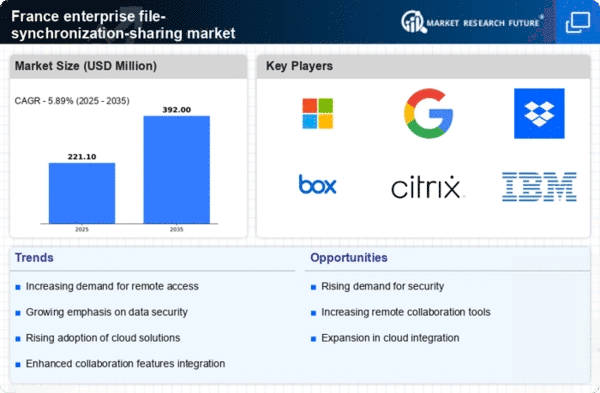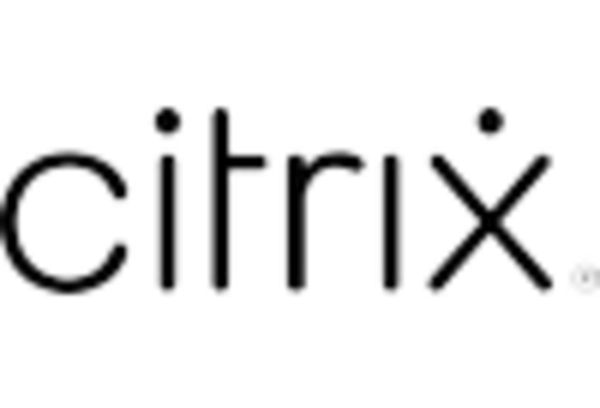Growing Remote Work Culture
The shift towards remote work in France has significantly influenced the enterprise file-synchronization-sharing market. As organizations adapt to flexible work arrangements, the need for efficient file sharing and synchronization tools has surged. According to recent studies, approximately 30% of the French workforce is now engaged in remote work, necessitating solutions that facilitate seamless collaboration among distributed teams. This trend has prompted businesses to invest in enterprise file-synchronization-sharing solutions that enable real-time access to files, ensuring productivity remains high regardless of location. The market is likely to see continued growth as companies recognize the importance of these tools in maintaining operational efficiency in a remote work environment.
Increased Focus on Data Security
Data security remains a critical concern for organizations in France, driving growth in the enterprise file-synchronization-sharing market. With cyber threats becoming more sophisticated, businesses are prioritizing solutions that offer advanced security features such as end-to-end encryption and multi-factor authentication. A recent survey indicated that over 60% of French companies consider data security a top priority when selecting file-sharing solutions. This heightened focus on security is likely to propel the demand for enterprise file-synchronization-sharing tools that can safeguard sensitive information while ensuring compliance with local regulations. As a result, vendors are compelled to enhance their offerings, thereby fostering innovation within the market.
Rising Data Compliance Regulations
The enterprise file-synchronization-sharing market in France is significantly influenced by increasing data compliance regulations. The General Data Protection Regulation (GDPR) mandates strict data handling and storage practices, compelling organizations to adopt solutions that ensure compliance. This regulatory environment drives demand for file synchronization and sharing tools that offer robust security features and audit trails. As organizations strive to avoid hefty fines, which can reach up to €20 million or 4% of annual global turnover, the need for compliant solutions becomes paramount. Consequently, vendors in the enterprise file-synchronization-sharing market are innovating to provide features that align with these regulations, thereby enhancing their market position and attracting clients who prioritize data protection.
Demand for Cost-Effective Solutions
Cost considerations are playing a pivotal role in shaping the enterprise file-synchronization-sharing market in France. Organizations are increasingly seeking cost-effective solutions that provide value without compromising on functionality. The rise of subscription-based models has made it easier for businesses to access advanced file-sharing tools without significant upfront investments. This trend is particularly relevant for small and medium-sized enterprises (SMEs) that may have limited budgets. As a result, the market is witnessing a shift towards affordable solutions that cater to the needs of diverse organizations. Vendors that can offer competitive pricing while maintaining high-quality features are likely to gain a substantial foothold in the enterprise file-synchronization-sharing market.
Emergence of Artificial Intelligence Technologies
The integration of artificial intelligence (AI) technologies into the enterprise file-synchronization-sharing market is a transformative driver. AI can enhance user experience by automating file organization, improving search functionalities, and providing intelligent recommendations. In France, organizations are increasingly recognizing the potential of AI to streamline workflows and enhance productivity. Reports suggest that AI-driven solutions could improve operational efficiency by up to 25%, making them attractive to businesses seeking competitive advantages. As AI technologies continue to evolve, their incorporation into file synchronization and sharing tools is likely to reshape the market landscape, offering new capabilities that meet the demands of modern enterprises.
















